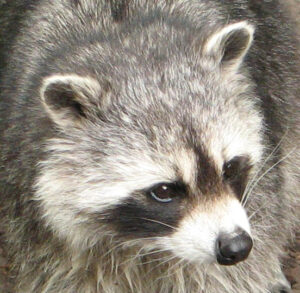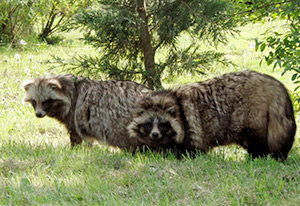Provisional results from continuing investigations into agents of disease in raccoon dogs and raccoons
The raccoon dog (Nyctereutes procyonides) and the raccoon (Procyon lotor) can carry pathogens that can pose a risk to human health. In 2016, the Dutch Food and Product Consumer Safety Authority (NVWA) commissioned the Dutch Department of Health and the Environment (RIVM) to continue the program of research in to parasites in these species. The DWHC contributes to this work by investigating the presence of pathogens in raccoons and raccoon dogs submitted for post-mortem exam. Other collaborators in the raccoon dog research program include the Bureau Mulder-natuurlijk, Altenburg & Wymenga and the Zoogdiervereniging who, commissioned by the BuRO of the NVWA, carry out research into the ecology of raccoon dogs in the Netherlands.
Results

wasbeer
In 2016 neither Trichinella spp. or Echinococcus multilocularis parasites were found in the five raccoon dogs that were examined by the DWHC. Of the three animals that were tested for the presence of the Baylisascaris procyonis parasite, one animal, from the southerly province South Limburg, was positive.
Help us by reporting finding a dead raccoon or raccoon dog
This research will be continued in 2017: In order to help the project please report finding a dead raccoon dog via the DWHC Submission form or by calling the DWHC on 030 – 253 79 25. After submitting your form you will be contacted by the DWHC who will advise you on how to package the cadaver and arrange collection of the package from your home or place of work.
You can find out more about the project on the DWHC website
Auteurs: Miriam Maas1, Margriet Montizaan2
1 Rijksinstituut voor Volksgezondheid en Milieu (RIVM)
2 Dutch Wildlife Health Centre (DWHC)




